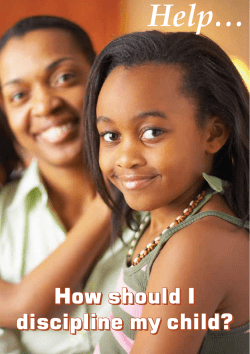
Spanking Can Harm Your Relationship with Your Child
Spanking Can Harm Your Relationship with Your Child by Leslie Petruk on yourtango.com Spanking is one of those hot button parenting topics, and most people have a strong belief on one side or the other. When considering discipline methods, I always talk to parents about 1) what you are teaching your child, 2) whether you are modeling the behavior you want your child to emulate, and 3) what the long term consequence/ impact of the discipline might be. “Discipline” comes from the word “disciple,” which means "to teach," so it's important to consider what your discipline methods are teaching your children. When you use spanking as a discipline method, you are sending the message that big people can hit little people and hitting is a way to resolve problems. If you spank your child when you are angry, you are modeling that when you are angry it's okay to hit. If you are using spanking as a disciplinary method but then get upset with your child for hitting you, a friend, or their sibling, they are getting a mixed message. Young children particularly are unable to discern why it is okay for you to "spank" but not okay for them to hit when they get upset or their sister isn't doing what she is supposed to be doing and they hit her. It sends mixed and confusing messages. While spanking may get the immediate response you want, the long term consequences may not be what you are hoping for. The immediate payoff may not be worth the long term consequence. Spanking begins to instill fear in a child and it teaches a child to be fearful of parents rather than teaching the child to consider his/her behavior and take responsibility for his/her actions. If used frequently, spanking can begin to create revenge in a child. The child will begin seeking ways to get back at you. Consequently, something you intend to use as discipline begins to create the very behavioral problems you are trying to discourage. Spanking is a form of hitting and shows a lack of respect for another person. If you expect your child to respect you, it's important that you extend the same to them. I often hear parents say, "I was spanked as a child, and I turned out okay." It's important to understand that we have a lot more information than we had even five years ago about the brain and how it works. When a child is in fear, they can not think rationally or make a good decision. Utilizing the information we have now to be better parents and raise healthier children is just like using the advances we've made in medicine and technology. Why would we use a more dangerous and less effective medication for treating cancer when we have newer and safer methods? The same is true for parenting. Research has repeatedly shown the ineffectiveness of spanking as a discipline method. It can damage your relationship with your child, create fear, mistrust and ultimately resentment. The best and most effective parents are connected to their children. If your child is afraid of you, it makes it hard for them to feel connected to you. So if you don't spank, then how do you discipline? Giving children choices and employing natural and logical consequences is an effective discipline method that teaches children responsibility, self-control, and consequences for their behaviors. For example, "Sally, I know you want to play with your brother's toy, but it's not okay to take it away from him while he's playing with it. You can choose to give it back to him, or you can choose to go to your room and lose your TV time for today. It's up to you, so you decide." When a child does break a rule, giving them a natural consequence is an effective way to teach them a lesson. For example, I worked with a child years ago who was caught spray painting on a brick wall at school. For his consequence, he had to spend a Saturday at the school removing all the paint from the entire school and then had to spend a week after school helping teachers clean their classrooms. I think he learned his lesson, and that was a much more effective learning experience than grounding, spanking or yelling! Of course, we are all human and as parents we are not perfect. We all lose our cool with our kids at one time or another. What is important is what we do afterwards. When we make a mistake as a parent, it presents a perfect opportunity for us to model for our children how one takes responsibility and apologizes for a mistake. When our children see that we can take responsibility for our actions, then we are teaching them how to take responsibility for theirs!
© Copyright 2025





















